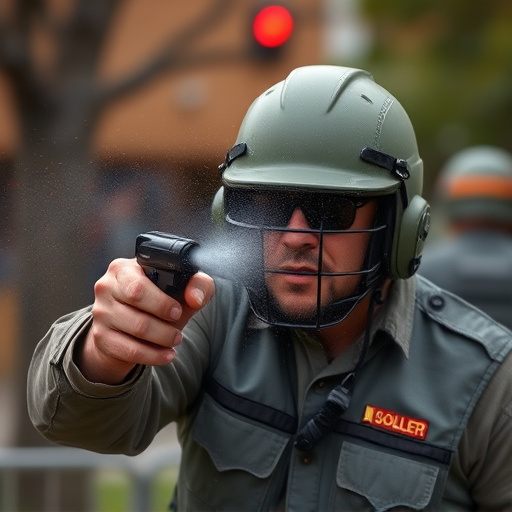Pepper spray, a non-lethal self-defense agent, temporarily disables attackers by targeting their eyes and face with capsaicin, an ingredient derived from chili peppers. It doesn't physically blind but causes intense irritation leading to temporary vision and breathing impairment. Effective use involves swift bursts at sensitive areas followed by retreat. Understanding legal constraints, safe deployment practices, and proper usage techniques is crucial to ensure its reliability as a self-defense tool without causing permanent blindness.
“Uncover the power of maximum strength pepper spray—a potent self-defense tool that could save lives. This comprehensive guide explores the science behind its effectiveness, addressing concerns about its blinding potential. We delve into the mechanisms of action, providing insights on how it works and dispel myths surrounding blindness.
From legal perspectives to practical defense strategies, this article equips readers with vital knowledge. Learn about usage guidelines, safety precautions, and proven techniques to ensure responsible and effective use during high-pressure situations, especially considering the critical question: can pepper spray truly blind you?”
- What is Pepper Spray and How Does it Work?
- Can Pepper Spray Blind You? Understanding the Mechanisms
- Legal Considerations and Usage Guidelines
- Effective Defense Strategies and Safety Precautions
What is Pepper Spray and How Does it Work?
Pepper spray, also known as oleoresin capsicum (OC) spray, is a non-lethal self-defense agent designed to temporarily incapacitate an attacker. It’s a liquid substance derived from chili peppers that contains capsaicin, the chemical responsible for the burning sensation associated with spicy foods. When sprayed into the eyes and face, pepper spray irritates these sensitive areas, causing temporary blindness, tears, coughing, and difficulty breathing. This overwhelming sensory input disorientates the attacker, providing the user with a crucial moment to escape or defend themselves further.
The effectiveness of pepper spray lies in its ability to disrupt normal cellular function by binding to capsaicin receptors in the eyes and respiratory system. This reaction leads to intense inflammation and pain, making it nearly impossible for the targeted individual to maintain their balance or coordination. While not intended to cause permanent damage, repeated or prolonged exposure can lead to temporary physical distress. It’s important to note that pepper spray is a powerful tool, but its effectiveness depends on proper usage, including knowing the right distance to apply it and understanding how to maximize its impact without endangering bystanders.
Can Pepper Spray Blind You? Understanding the Mechanisms
Many people wonder, can pepper spray blind you? The short answer is no, pepper spray cannot physically blind you. However, the intense irritation and pain it causes can lead to temporary blindness due to the user’s reaction. Pepper spray works by irritating the eyes and respiratory system through capsaicin, a chemical found in chili peppers. This irritation triggers a series of physiological responses, including tear production, watery eyes, and difficulty breathing or seeing. While these effects are highly unpleasant and disorienting, they are not permanent.
The mechanism behind pepper spray’s effectiveness does not involve physical damage to vision. Instead, it exploits the body’s natural defenses against irritants. The eyes’ overactive response to the spray leads to temporary blindness, but once the capsaicin leaves the system, vision typically returns to normal within a few minutes. Understanding these mechanisms can help demystify how and why pepper spray causes such intense reactions, emphasizing its power as a self-defense tool.
Legal Considerations and Usage Guidelines
When considering maximum strength pepper spray as a defense, it’s crucial to understand the legal considerations and usage guidelines surrounding its employment. Each jurisdiction has specific laws governing the use of pepper spray by civilians, with varying restrictions on who can possess, carry, and deploy it. It’s essential to research and comply with local, state, or provincial regulations to avoid legal repercussions.
One common concern is the potential for pepper spray to cause permanent blindness, especially when used irresponsibly. While pepper spray is designed to incapacitate temporarily, direct contact with eyes can lead to severe eye irritation, tearing, and even temporary loss of vision. Therefore, users must adhere to usage guidelines, aiming away from faces and eyes, ensuring minimal risk to themselves and others.
Effective Defense Strategies and Safety Precautions
Pepper spray, despite its powerful effect, is not designed to blind you but rather to temporarily disable and deter an attacker. When used correctly, it can provide a valuable defense strategy. Effective techniques include aiming for the face, eyes, and nostrils—areas highly sensitive to capsaicin, the active ingredient in pepper spray. A swift motion, such as spraying towards the attacker’s face and quickly stepping back, is crucial for safety.
Safety precautions are paramount. Always keep pepper spray readily accessible and ensure you know how to operate it effectively. Regularly practice activation and deployment techniques to react instinctively during an emergency. Remember, proper usage involves a quick burst, followed by retreat—never engage in prolonged or direct contact with the sprayed individual.
Pepper spray, while a powerful self-defense tool, is not without its controversies, especially regarding the risk of permanent eye damage. Understanding how it works and adopting effective defense strategies is crucial. While it’s unlikely to cause permanent blindness in most cases, following legal guidelines and prioritizing safety precautions can significantly minimize potential harm. Knowing when and how to use pepper spray responsibly can make all the difference in self-defense situations.
